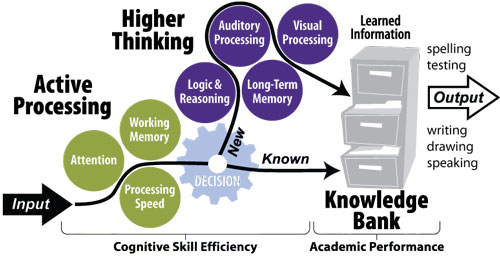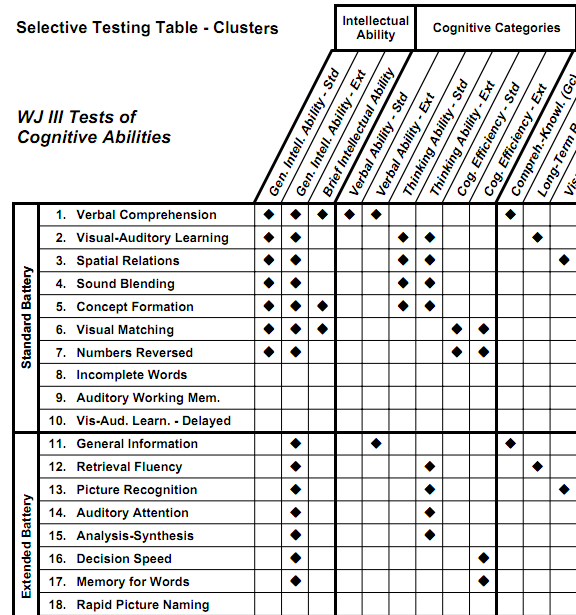Can Pulsed Light-and-Sound Enhance Your Brain?
 The idea behind mind machines is intriguing. They are simple devices that use pulsed sound and light to trick your brainwaves into certain patterns and put you in specific mental states such as relaxation or alertness. The question is do they really work?
The idea behind mind machines is intriguing. They are simple devices that use pulsed sound and light to trick your brainwaves into certain patterns and put you in specific mental states such as relaxation or alertness. The question is do they really work?
There is some scientific evidence that brainwave entrainment can have a therapeutic impact. There are a handful of small companies that manufacture and have sold mind machines for decades. Yet they remain on the fringe.
While I am not endorsing any specific product or company, you can learn more by checking out this video by the folks at Mind Alive. One of their mind machines (pictured to the right) runs about $500.
In the video they talk about how this technology delivers a “made to order mental state”. They also emphasize that given its ability to help manage stress it should be in every home. Perhaps if we had an iPhone or Droid app that turns a smart phone into a mind machine that will happen.
Very interested to hear from readers that use some form of mind machine. How long have you used it? What effects does it produce?
Categories: Mental Focus, Music and Audio, Other, Sleep Tags: Brainwave Entrainment
Get Some Mental Toughness on April 25th
 Mental toughness is the idea that we can train our brains to be in a higher state of readiness and more resilient to stress and challenges from the environment. The idea grew out of sports psychology where high performing athletes exert tremendous mental control and focus on demand and under great pressure. It is being applied in the US military and is the subject of dozens of books aimed at improving success in ordinary life.
Mental toughness is the idea that we can train our brains to be in a higher state of readiness and more resilient to stress and challenges from the environment. The idea grew out of sports psychology where high performing athletes exert tremendous mental control and focus on demand and under great pressure. It is being applied in the US military and is the subject of dozens of books aimed at improving success in ordinary life.
We have covered some of the techniques of mental toughness here in the Next Brain Blog. For those interested in learning more I recommend checking out the Mental Toughness Summit. This is a free on-line event that runs from April 25-29th. Some of the best names in the business are involved and it is sure to be loaded with specific ideas from improving brain function and cognitive performance. The host, Renita Kalhorn, will interview 12 leaders in the field. Attendees get to listen in as well as review recording of the interviews over a 24-hour period. There is also the option to upgrade to a premium service where you pay for an MP3 of the interviews.
I am going to attend as much as possible and will blog what I learn. I hope some readers are able to attend too and will share their insights.
Categories: Cognitive Development, Mental Focus, Training Tags:
Art Forms as Cognitive Enhancers?
 There is growing scientific evidence that experiencing art both passively and actively can improve brain function and cognitive performance. Art is used as a form of cognitive therapy with older adults and art training is advocated for children by some experts:
There is growing scientific evidence that experiencing art both passively and actively can improve brain function and cognitive performance. Art is used as a form of cognitive therapy with older adults and art training is advocated for children by some experts:
Michael Posner argues that when children find an art form that sustains their interest, the subsequent strengthening of their brains’ attention networks can improve cognition more broadly.
Experiencing art means experiencing beauty which is powerful emotive and intellectual stuff. There are many anecdotal claims that it enhances mental energy, creativity, improves focus and relieves stress.
Some readers of the Next Brain Blog (including myself) have reported success with a very simple art-based technique.
- Find an a new art form that deeply resonates with you. Mine turned out to be the work of Juri Morioka (see sample above).
- Acquire legal, affordable and high quality copies.
- Consciously experience it on a daily or frequent basis.
It is important to find a new art form, not one you have always liked. Also you may need to change the specific pieces you experience periodically to maintain the intensity of the cognitive effects.
Interested to hear from readers that use this or other art-based techniques to enhance brain function and cognitive performance.
Image source: Paintings by Juri Morioka
Categories: Child, Cognitive Decline, Cognitive Development, Lifestyle, Mental Focus, Older Adult, Perception Tags: art
Popularity of Smart Drugs – See the Movie
 A wide variety of pills and drugs promise to improve brain function or help us achieve peak cognitive performance. Called cognitive enhancers, smart pills or nootropics they reportedly improve mental energy and focus, memory or creativity through altered states. They include drugs such as cannabis and hallucinogens as well as off-prescription use of medications especially those used for attention-deficit disorders such as Adderall.
A wide variety of pills and drugs promise to improve brain function or help us achieve peak cognitive performance. Called cognitive enhancers, smart pills or nootropics they reportedly improve mental energy and focus, memory or creativity through altered states. They include drugs such as cannabis and hallucinogens as well as off-prescription use of medications especially those used for attention-deficit disorders such as Adderall.
The use of smart drugs appears wide spread in colleges and the professions. Their short term and long-term impact on those seeking higher cognitive performance has not been studied. Smart pills are so popular they even star in movies. Just released, the movie Limitless stars a smart pill to access the other 90% of your brain. It transforms your life. But there is a catch.
Interested to hear from readers that use smart pills to enhance brain function or cognitive performance. What do you take, how much and how does it work?
Categories: Memory and Learning, Mental Focus Tags: mental energy, smart drugs
Brain Teaser Made of 216 Tiny Magnets
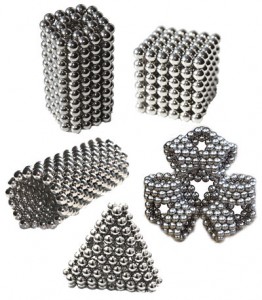 There is some evidence that working puzzles and playing certain types of games helps to maintain brain function and improves specific areas of cognitive performance. There are many posts on the Next Brain Blog about such games.
There is some evidence that working puzzles and playing certain types of games helps to maintain brain function and improves specific areas of cognitive performance. There are many posts on the Next Brain Blog about such games.
One I was recently introduced to is made up of 216 small but very powerful magnets that you can recombine into a wide variety of shapes. It is a simple addictive toy. Although I am not aware of any studies on its effectiveness, the idea is to stimulate your brain by thinking up and making fun and interesting shapes. And it seems popular with those interested in brain training. A version of it called, Buckyballs, is a brainy bestseller at Marbles – the brain store.
Working with your hands to make a shape you dreamed up or just play around is a key feature. You accidentally discover cool shapes and learn a little bit about the laws of physics.
Interested to hear from readers about other direct manipulation toys that seem to have a brain boosting effect.
Categories: Mental Focus, Perception, Problem Solving Tags: games
Speaking Two Languages Acts as Mental Gym
 New research from Penn State, Juggling Languages Can Build Better Brains, overturns previous thinking about the impact speaking more than one language on brain function. Rather than creating confusion, it turns out that being bilingual or learning to speak a second language can improve your ability to multi-task. Specifically:
New research from Penn State, Juggling Languages Can Build Better Brains, overturns previous thinking about the impact speaking more than one language on brain function. Rather than creating confusion, it turns out that being bilingual or learning to speak a second language can improve your ability to multi-task. Specifically:
“Recent research indicates that bilingual speakers can outperform monolinguals–people who speak only one language–in certain mental abilities, such as editing out irrelevant information and focusing on important information, said Judith Kroll, Distinguished Professor of Psychology, Penn State. These skills make bilinguals better at prioritizing tasks and working on multiple projects at one time.”
Learning a second language requires considerable time and energy. You also need to be in a situation where you can use both languages regularly. Despite these difficulties techniques proven to build your mental focus are rare. Improved mental focus pays a lifetime of benefits.
Interested to hear from bi or multi lingual readers willing to share their impressions on how additional languages are impeding or accelerating their brain function and cognitive performance.
Categories: Mental Focus, Problem Solving, Training Tags:
Evidence Mounts – Caffeine & Sugar Boost Cognitive Performance
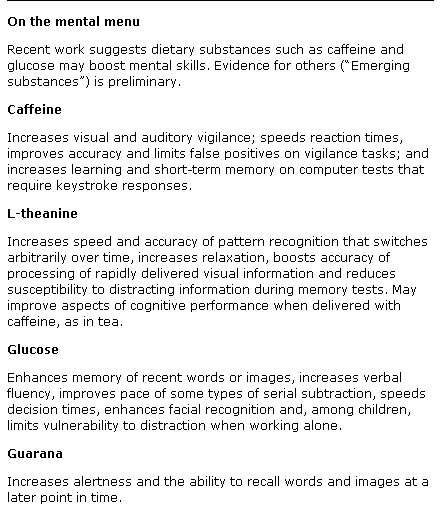 Science News just published an easy to read review article on what the latest scientific studies reveal about nutritional supplements and brain function. The evidence that certain supplements are brain boosters is really mounting. The “mental menu” shown to the right is taken directly from the article.
Science News just published an easy to read review article on what the latest scientific studies reveal about nutritional supplements and brain function. The evidence that certain supplements are brain boosters is really mounting. The “mental menu” shown to the right is taken directly from the article.
This means for example, a snack including caffeinated tea and a sugary treat should produce a short-lived but intense boost in mental energy and cognitive performance.
Categories: Diet, Executive Function, Memory and Learning, Mental Focus Tags:
Vastly Improve Mental Focus By Switching
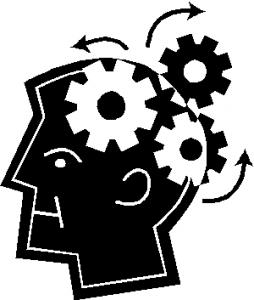 Prolonging mental focus is not about taking a rest break but momentarily switching to a task to get a jolt of mental energy or novelty.
Prolonging mental focus is not about taking a rest break but momentarily switching to a task to get a jolt of mental energy or novelty.
Staying focused on a specific task or topic can be difficult. Called vigilance or our ability to “keep watch” it is vitally important for top mental performance in any field. As such we will cover scientific studies on how to improve mental focus and vigilance on the Next Brain Blog.
For example, new research from University of Illinois reported in the journal Cognition found that brief diversions from a task actually vastly improves your mental focus. While we all know you need to take breaks to stay fresh, this finding is different.
Test subjects in this study memorized four digits (four different numbers each less than 10) before taking on a different mental task for 50 minutes. Subjects were told to signal if they saw one of the digits flash on the computer screen they were working with. Some of the test subjects were shown digits during work on the 50-minute task (called the switch group) others were not. There was also a control group that knew nothing about the digits but saw them during the task. Here is what they found:
“As expected, most participants’ performance declined significantly over the course of the task. But critically, Lleras said, those in the switch group saw no drop in their performance over time”.
The brief diversions rather than hurting mental focus provides the novelty that we need to stay focus. We lose mental focus when nothing changes. We get bored and details fad into the background.
Note the switch group did not take a five minute break, they did not even take a 1 minute break. It is not about resting. It is about getting a small jolt of mental energy or novelty.
You can improve cognitive performance on long tasks by momentarily switching to tasks that provide a small dash of mental novelty. Interested to hear from readers that use this technique. What small diversions or switching tasks do you use?
Categories: Executive Function, Lifestyle, Mental Focus Tags: mental energy
LearningRx – A Brain Training Center Near You
A reader shared an experience they had with LearningRx a consumer center for brain training. They promise to improve your academic performance by providing coached training on a full range of cognitive skills (see diagram).
The process starts with a formal assessment using the Woodcock-Johnson assessment for cognitive abilities (partially shown below).
You are then matched with a coach and work 3-5 days per week for an hour a day for 3 months. They claim a 3.6 year improvement on the cognitive assessment and have some studies to back it up.
LearningRx has centers across the US and they want to open more using a franchise approach. Interested to hear from other readers that have used this service.
Categories: Child, Cognitive Development, College Student, Memory and Learning, Mental Focus, Perception, Training Tags: brain training
Can Specific Scents Boost Cognitive Performance?
 Scents and odors have a swift and powerful impact on our brains. They can trigger memories and moods and signal the intentions and feelings of others. But can specific scents be used to improve our brain function and cognitive performance?
Scents and odors have a swift and powerful impact on our brains. They can trigger memories and moods and signal the intentions and feelings of others. But can specific scents be used to improve our brain function and cognitive performance?
There are scientific studies that suggest the scent of vanilla, cinnamon, roses and peppermint impact attention, memory and mental energy.
For example, a recent study in the North American Journal of Psychology pointed out:
“Past research indicates the odors of peppermint and cinnamon (1) enhance motivation, performance, and alertness, (2) decrease fatigue, and (3) serve as central nervous system stimulants.”
I could not find many scientific studies. The impacts they measure are not large or sustained.
There are also some suggested uses of odor in brain training, especially in the approach called neurobics. For example, in the book Keeping Your Brain Alive, the authors suggest:
- Wake up and smell the vanilla: Release the smell of an extract (vanilla, citrus, peppermint or rosemary) just as you awake every morning for a week.
- The scent of music: Sniff specific odors while listening to a song to stimulate novel sensory associations in your brain.
Scent can be delivered from simple cotton balls, plug-in devices, sprays or oils spread by small fans in low-cost electric aromatherapy diffusers. This makes it relatively easy to experiment with scents and cognitive performance. For example, scenting a room while studying, taking sniffs of specific scents just before or after a mental task and so on.
Interested to hear from readers that use scent to boost performance or as part of a brain training routine.
Categories: Memory and Learning, Mental Focus, Other Tags: scents


